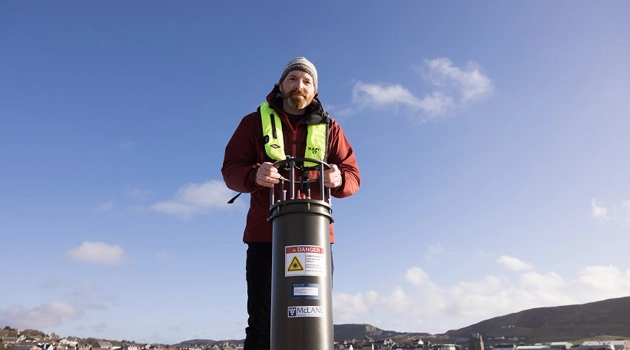Salmon farm company to convert waste to useable product
The process known as pyrolysis converts aquaculture waste into biochar, which will be used by the forestry sector
Make your life easier with a MyHIE account. It’ll save you time, help you find and organise content based on your needs and interests.


Shellfish and finfish businesses in Shetland are set to benefit from new technology designed to inform optimal and sustainable growth in the aquaculture sector.
UHI Shetland has secured £185,000 investment from HIE to purchase a high-tech piece of equipment known as an Imaging FlowCytobot (IFCB).
The IFCB can scan water samples for phytoplankton (micro-algae) using flow cytometry, lasers and cameras. It then beams this data to the cloud for specialist analysis allowing phytoplankton detection and monitoring.
Phytoplankton are crucial to the success of mussel farms, but some phytoplankton species produce toxins or can even be harmful to fish when they bloom in large numbers.
The device works in the lab but, importantly, it is also submersible and can work unattended in-situ at an aquaculture site or monitoring station.
By working around the clock, the IFCB detects early signs of harmful algal blooms, and this rapid detection can help to inform early stock management decisions that can protect the welfare and security of aquaculture stocks.
Farm operators will be able to use the information collated to better understand the quality of the water and the impacts of this on their operations. They will also be able to understand how their activities impact on the natural environment.
Over time, the plankton data can also be used to identify impacts of climate change on the marine environment.
Shetland-UHI is currently preparing the device for deployment and will then investigate data handling solutions.
Working with colleagues at the Scottish Association for Marine Science (SAMS), machine learning capabilities, using a deep learning artificial intelligence approach, will be developed to identify and count individual species present in a local waterbody from the tens of thousands of images captured by the IFCB every hour.
Running alongside these developments will be a PhD studentship, led by SAMS UHI, Marine Scotland and The DataLab, which is currently being recruited.
Gregg Arthur, aquaculture manager at Shetland-UHI said:
“This autonomous device is a game changer and this second IFCB to come to the UK complements a project already running in the Isles with Seafood Shetland, which includes the first IFCB and is supported by the SIC’s Coastal Communities. We’re excited to see the instrument’s capabilities. The IFCB gives us a much higher resolution picture of phytoplankton abundance at any given time and is a specialist tool for monitoring numbers and species as these change throughout the seasons.
“This will be a very important dataset allowing us to improve our approaches to sustainable aquaculture. Successful aquaculture relies upon understanding our interactions with the natural environment and this device will enhance our capability and knowledge significantly in the area where it’s deployed.”
Elaine Jamieson, head of blue economy and food and drink at HIE, said:
“The ambition for continuous improvement by utilising new data driven technology is a credit to both academia and businesses in the aquaculture sector. This investment creates new opportunities that are aligned to our ambitions for sustainable use of ocean resources for economic growth, improved livelihoods and community prosperity.”
Half of the HIE funding approval is from the Scottish Government Islands Green Recovery Programme, which was administered in the region by HIE.
Rural Affairs Secretary Mairi Gougeon said:
“As well as being a source of nutritious, low-carbon food, aquaculture is a significant contributor to the rural economy, providing well paid jobs in some of Scotland’s most fragile communities.
“It is an essential part of our green recovery and transition to net zero and I welcome the development and acquisition of this technology to help protect the welfare and security of aquaculture stocks.
“Previous studies have shown that the aquaculture sector purchased 76% its supplies from within Scotland and this development has the potential to increase the circular supply chain in the future.”
The process known as pyrolysis converts aquaculture waste into biochar, which will be used by the forestry sector
Bloom & Graze Ltd is developing half of the town’s railway station building to form its new premises.
Over the next three years, the project is expected to generate nearly £1m in turnover and create 12 new jobs.
The work involves the redevelopment of the company’s existing marine hatchery facilities, including new tanks, controls, lighting, water circulation and energy efficiency measures.
New state of the art automated plant and machinery, including artificial intelligence (AI), is being installed.
Argyll Coffee Roasters to attend the Producer Roaster Forum (PRF) in Honduras
evaporation pond that will produce an additional 1,000 kg of salt a year
Science Skills Academy (SSA) has teamed up with Equinor to extend the roll out of pop-up Newton Rooms to Shetland.
Investment by Forres-based Maclean’s Highland Bakery will create up to five new jobs
Firms can feature in the ‘Scotland at Aqua Nor’ brochure, exhibit at the pavilion, or attend to network
An innovative project to increase production and reduce carbon emissions at a mussel firm in Shetland has secured a £49,983 contribution from HIE.